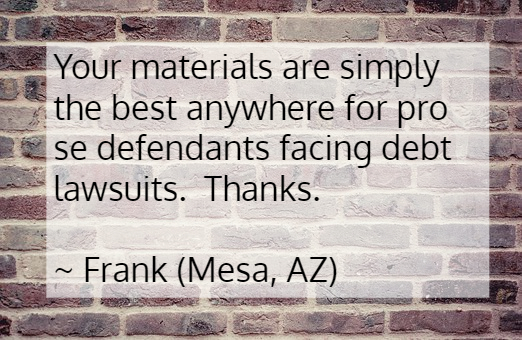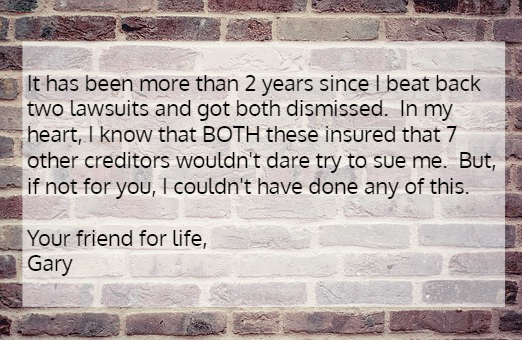Although hiring a lawyer might be the “gold standard” of defense, lawyers are always expensive. If you’re being sued by a debt collector and can’t afford a lawyer, all is not lost. You CAN represent yourself. This is not complicated law, debt collectors are not innovative or particularly energetic, and the debt collection system is a “factory” approach not designed to work against people who defend themselves intelligently. You can do it.
Okay – maybe debt defense isn’t always very fun. In fact, most of the time it isn’t exactly fun, but it is easier than you expect, and winning is great. Going from the threat of having to pay (somehow) from $1,000 to $50,000 to some debt collector, to having them drop the case – or to settling with you for pennies on the dollar… that’s fun, and it changes the way you look at debt and debt law forever.
Pro se legal representation means representing yourself rather than hiring a lawyer to do it for you. You have the right to do that in essentially any court proceeding, whether as defendant or plaintiff, and whether the matter is civil (for money) or criminal. Pro se is a Latin phrase meaning “for oneself,” and you will sometimes see it called propria persona (abbreviated to “pro per”). In England and Wales, the comparable status is called “litigant in person.”
Some Think It’s Scary
Although man y people fear the thought of representing themselves in court, pro se representation is not rare. According to National Center on State Courts in 1991-92 71% of domestic relations (family law) cases had at least one unrepresented party, and in 18% of the cases both parties were pro se. It is a growing trend in debt collection law as well as family law and other matters.
y people fear the thought of representing themselves in court, pro se representation is not rare. According to National Center on State Courts in 1991-92 71% of domestic relations (family law) cases had at least one unrepresented party, and in 18% of the cases both parties were pro se. It is a growing trend in debt collection law as well as family law and other matters.
The right of self-representation has long been established in the United States. It predates even the ratification of the Constitution, as Section 35 of the Judiciary Act of 1789—enacted by the first Congress and signed by President Washington, states that, “in all the courts of the United States, the parties may plead and manage their own causes personally or by the assistance of counsel.” Most states have a similar constitution provision.
Will the Courts Protect You from Mistakes?
The California rules of Civil Procedure explicitly express a preference for resolution of every case on the merits, even if resolution requires excusing inadvertence by a pro se litigant that would otherwise result in a dismissal. The Judicial Council justifies this rule with the argument that “Judges are charged with ascertaining the truth, not just playing referee.” And the Council suggests “the court should take whatever measures may be reasonable and necessary to insure a fair trial.”
Although most states and the federal courts share this bias in favor of hearing courts on “their merits,” (based on what is actually fair), pro se litigants cannot rely on any special treatment. Some courts explicitly will not extend favorable treatment to non-professional litigants.
Pro Se Litigants Often Do Very Well
They may not need any extra help. According to Erica J. Hashimoto, an assistant professor at the Georgia School of Law, criminal defendants are “not necessarily ill-served” by the decision to represent themselves. In state court, pro se defendants charged with felonies probably fared much better than represented defendants. Of the 234 pro se defendants studied by Ms. Hashimoto, “just under 50 percent of them were convicted on any charge….for represented state court defendants, by contrast, a total of 75 percent were convicted of some charge.” And just 26 percent of the pro se defendants ended up with felony convictions, whereas 63 percent of represented defendants in Ms. Hashimoto’s study did. In federal court…the acquittal rate for pro se defendants is virtually identical to the acquittal rate for represented defendants.
Of course there could well be other important variables that the Hashimoto study did not include, but it seems clear that there is nothing like an “automatic penalty” for daring to represent yourself. And as I have pointed out many times elsewhere, there are certain types of cases and situations where pro se representation may actually be an advantage. In debt collection cases, for example, the economic factors often outweigh legal issues, and a vigorous pro se defendant can gain a significant advantage by being able to take energetic steps in his or her favor that a lawyer—always on the clock—would pragmatically be unable to take.
Courts are not always favorable to self-represented people for various reasons, but even with that bias, pro se plaintiffs have recorded some significant victories in civil courts. For example, Robert Kearns, inventor of the intermittent windshield wiper who won more than $10 million from Ford for patent infringement; Reginald and Roxanna Bailey, a married couple, together won $140,000 from Allstate Insurance in a federal jury trial in Missouri, and George Cofield, a janitor, won $30,000 from the City of Atlanta in 1980. Among others. Pro se defendants encounter fewer prejudices and have many more victories. These victories often occur in less easily reportable fashion, being simply the unheralded dismissal of a debt collection action.
Pro Se Representation in Debt Collection Cases
As pointed out above, defendants in debt collection cases have some significant economic advantages in conducting their cases. They also have fewer of the disadvantages that many other types of cases have. This may simply be because debt collection cases tend to be document-intensive rather than witness-intensive. In the somewhat unusual case which actually goes to trial, the court is confronted with basic evidentiary questions: can the debt collector produce enough evidence? And is it “admissible” in court for the court’s consideration? Little finesse is required.
This basic legal simplicity, the fact that debt defendants were obviously brought before the court against their wishes, and the general economic difference between typical debt defendants and plaintiffs often seem to create a favorable impression on the judges.
Get Help
If you would like us to take a look at your case and give you a sort of roadmap to what you need to do and how, take a look at our Personalized Evaluation product. If you’re being sued and already know you want to defend yourself without spending a lot of money on lawyers, then get out Debt Defense System.
Protect Your Rights
If you are being contacted by debt collectors, you need to be alert to protect your rights. These calls are often a prelude to their suing you. You migh t consider membership with our site, which gets you our ecourses for free, plus gives you many other benefits.Check out some of our e-courses. Or consider our prepaid legal plan to protect you from future possible litigation. With that, if you get sued, you’ll get a lawyer to defend you for free.
t consider membership with our site, which gets you our ecourses for free, plus gives you many other benefits.Check out some of our e-courses. Or consider our prepaid legal plan to protect you from future possible litigation. With that, if you get sued, you’ll get a lawyer to defend you for free.






